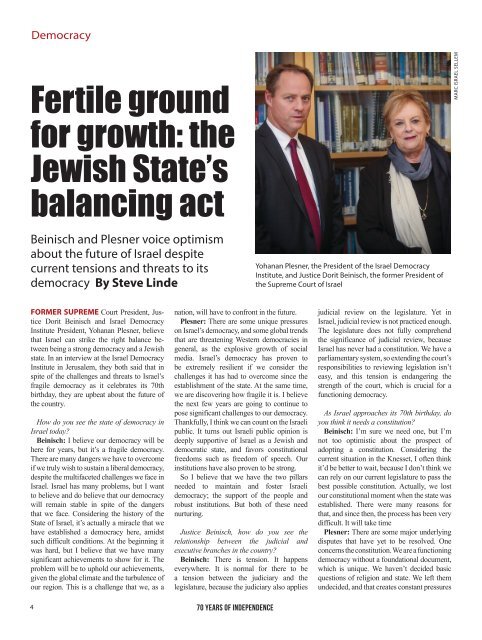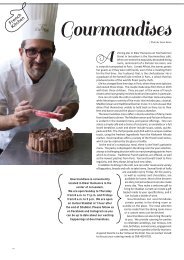IDI.2018
Create successful ePaper yourself
Turn your PDF publications into a flip-book with our unique Google optimized e-Paper software.
Democracy<br />
Fertile ground<br />
for growth: the<br />
Jewish State’s<br />
balancing act<br />
MARC ISRAEL SELLEM<br />
Beinisch and Plesner voice optimism<br />
about the future of Israel despite<br />
current tensions and threats to its<br />
democracy By Steve Linde<br />
Yohanan Plesner, the President of the Israel Democracy<br />
Institute, and Justice Dorit Beinisch, the former President of<br />
the Supreme Court of Israel<br />
FORMER SUPREME Court President, Justice<br />
Dorit Beinisch and Israel Democracy<br />
Institute President, Yohanan Plesner, believe<br />
that Israel can strike the right balance between<br />
being a strong democracy and a Jewish<br />
state. In an interview at the Israel Democracy<br />
Institute in Jerusalem, they both said that in<br />
spite of the challenges and threats to Israel’s<br />
fragile democracy as it celebrates its 70th<br />
birthday, they are upbeat about the future of<br />
the country.<br />
How do you see the state of democracy in<br />
Israel today?<br />
Beinisch: I believe our democracy will be<br />
here for years, but it’s a fragile democracy.<br />
There are many dangers we have to overcome<br />
if we truly wish to sustain a liberal democracy,<br />
despite the multifaceted challenges we face in<br />
Israel. Israel has many problems, but I want<br />
to believe and do believe that our democracy<br />
will remain stable in spite of the dangers<br />
that we face. Considering the history of the<br />
State of Israel, it’s actually a miracle that we<br />
have established a democracy here, amidst<br />
such difficult conditions. At the beginning it<br />
was hard, but I believe that we have many<br />
significant achievements to show for it. The<br />
problem will be to uphold our achievements,<br />
given the global climate and the turbulence of<br />
our region. This is a challenge that we, as a<br />
4<br />
nation, will have to confront in the future.<br />
Plesner: There are some unique pressures<br />
on Israel’s democracy, and some global trends<br />
that are threatening Western democracies in<br />
general, as the explosive growth of social<br />
media. Israel’s democracy has proven to<br />
be extremely resilient if we consider the<br />
challenges it has had to overcome since the<br />
establishment of the state. At the same time,<br />
we are discovering how fragile it is. I believe<br />
the next few years are going to continue to<br />
pose significant challenges to our democracy.<br />
Thankfully, I think we can count on the Israeli<br />
public. It turns out Israeli public opinion is<br />
deeply supportive of Israel as a Jewish and<br />
democratic state, and favors constitutional<br />
freedoms such as freedom of speech. Our<br />
institutions have also proven to be strong.<br />
So I believe that we have the two pillars<br />
needed to maintain and foster Israeli<br />
democracy; the support of the people and<br />
robust institutions. But both of these need<br />
nurturing.<br />
Justice Beinisch, how do you see the<br />
relationship between the judicial and<br />
executive branches in the country?<br />
Beinisch: There is tension. It happens<br />
everywhere. It is normal for there to be<br />
a tension between the judiciary and the<br />
legislature, because the judiciary also applies<br />
70 YEARS OF INDEPENDENCE<br />
judicial review on the legislature. Yet in<br />
Israel, judicial review is not practiced enough.<br />
The legislature does not fully comprehend<br />
the significance of judicial review, because<br />
Israel has never had a constitution. We have a<br />
parliamentary system, so extending the court’s<br />
responsibilities to reviewing legislation isn’t<br />
easy, and this tension is endangering the<br />
strength of the court, which is crucial for a<br />
functioning democracy.<br />
As Israel approaches its 70th birthday, do<br />
you think it needs a constitution?<br />
Beinisch: I’m sure we need one, but I’m<br />
not too optimistic about the prospect of<br />
adopting a constitution. Considering the<br />
current situation in the Knesset, I often think<br />
it’d be better to wait, because I don’t think we<br />
can rely on our current legislature to pass the<br />
best possible constitution. Actually, we lost<br />
our constitutional moment when the state was<br />
established. There were many reasons for<br />
that, and since then, the process has been very<br />
difficult. It will take time<br />
Plesner: There are some major underlying<br />
disputes that have yet to be resolved. One<br />
concerns the constitution. We are a functioning<br />
democracy without a foundational document,<br />
which is unique. We haven’t decided basic<br />
questions of religion and state. We left them<br />
undecided, and that creates constant pressures
















